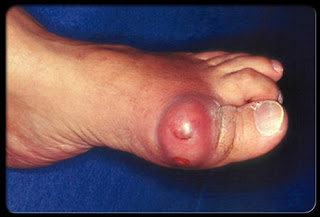Easy Way to Know about Big Toe Pain
Although big toe pain is a common problem but many people do not know how to
treat it and prevent it, probably because there are many causes with a variety
of different diagnoses. It can be hard to find out the exact cause of the pain,
and the best way to treat the condition. Because of your big toe is the main
stabilizer when you walk or run and both
can be affected if
you constantly suffering from pain in this area.
As long as you have had it confirmed
by a doctor that there is no serious underlying condition, most of the time
this pain can be treated by yourself.
Causes of Big Toe Pain
There are several causes of big toe
pain is as follows :
- One
of the most common causes of big toe pain,
and also one of the most easily recognised is a bunion. The condition is
usually the result of wearing tight fitting shoes, with high heels exacerbating
the problem. A bunion is the displacement bone at the first metatarsophalangeal
joint of the foot, or can be due to excessive bone formation. The bony lump can
be prone to inflammation and swelling, with accompanying pain, and make wearing
shoes problematic.
- Gout
is a relatively common hereditary disorder which commonly affects the big toe.
It is due to the body's inability to deal with uric acid which creates a high
blood concentration, which in turn causes uric acid crystals to form in the
joints such as the big toe. The condition can cause intense pain with
intermittent painful episodes. 90% of sufferers experience big toe pain at some
point, with 50% of first time sufferers affected in the toe. The condition has
also been linked to a purine rich diet.
- Hallus
rigidis is a form of osteoarthritis which affects the big toe causing the toe
to become stiff, usually at the base. The condition is caused by wear and tear,
but can occur at an early age, when excess forces have been placed on the feet
over time. Since the condition is often accompanied by swelling and
inflammation, and occurs on the same joint as a bunion, the two problems are
often confused in a home diagnosis. Hallus rigidis is a degenerative condition,
however early treatment can help to limit the damage caused and prevent pain,
with an early diagnosis important.
Home Treatment of Pain in Big Toe
Big toe pain treatment can usually be provided alone in
your own home by using various methods such as the following :
- Massaging
is great for relieving big toe pain. There are many different techniques that
you can apply and all seem to help. Try searching on the internet for the best
toe massaging techniques and then aim to do these every day.
- Bunion pads fit in the sides of
the shoes to cushion the bunion and prevent abrasion and are highly effective
in mild cases.
- You must wear good fitting shoes. Always
buy shoes that are half a size larger than your feet to avoid crowding of the
toes. If toe pain is persistent, you can try a pair of specially made
orthotics. These shoes can usually only be given by a podiatrist who has done a
full examination of your feet and toes. These shoes often put a stop to chronic
toe pain.
- Various dietary modifications,
lifestyle changes and anti-inflammatory drugs (NSAID's)
- Avoid wearing high heeled shoes
will make the problem much more painful.
- Custom orthoses or temporary
inserts may improve the function of your foot so you may need to see your
Podiatrist for advice. By re-balancing your feet and redistributing your body
weight, orthoses will help to alleviate the problem.
- Home exercise program to help
restore some movement in your big toe.
- Podiatric treatment to help
restore movement and break down adhesions around the joint.
- Podiatric Acupuncture for pain
management and to help rehabilitate the affected area.
- Simple insoles to offload your
feet.
- Anti-inflammatory medication to
reduce swelling around the joint.
- RICE - Rest, Ice, Compression and
Elevation.
With some home treatment of big toe
pain and does not hurt to try it and hopefully this pain will be cured, but if
the pain does not subside, return to your doctor for your big toe to be checked
again.

No comments:
Post a Comment